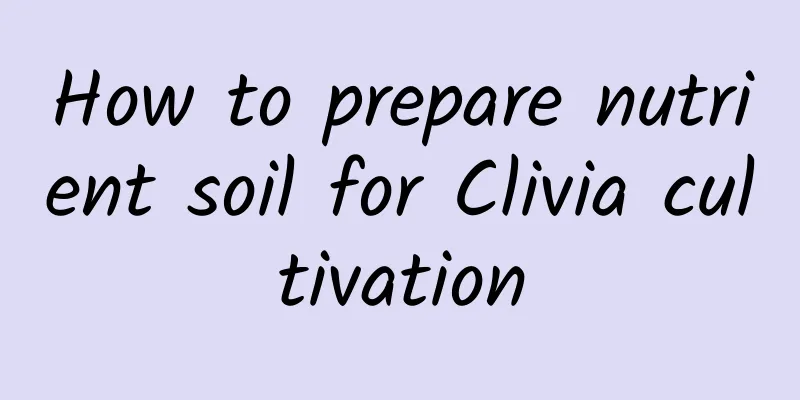How to prepare nutrient soil for Clivia cultivation

Clivia soil preparation requirementsClivia prefers a well-ventilated growing environment and is suitable for planting in slightly acidic soil with good air permeability, good water permeability, fertile soil and a pH of 6.5, so special nutrient soil should be prepared for cultivation. The nutrient soil for Clivia needs to be mixed with a variety of soils, such as humus, leaf humus, pine needles, river sand, etc. The commonly used formula is a mixture of leaf humus and river sand, with a ratio of 2:1. If we want to provide better nutrition for the growth of Clivia, we can use leaf mold, pine needles, river sand and base fertilizer in a ratio of 5:3:1:1. How to prepare soil for Clivia1. Generally, the configuration of the soil for Clivia needs to be prepared according to the ratio of 5 parts of leaf mold, 3 parts of pine needles, 1 part of river sand, and 1 part of base fertilizer. The soil configured in this way is more suitable for the growth of Clivia. 2. After the above soils are mixed according to the proportions, disinfect them with potassium permanganate first. The simplest method is to soak them with hot water, then dry them in the sun for 2-3 days before using them as cultivation soil. In this way, a nutritious soil suitable for the growth of Clivia is prepared. Precautions for preparing Clivia soil1. Clivia has relatively high requirements for soil. It likes loose, breathable, fertile soil, and preferably slightly acidic. 2. The prepared soil may contain a large number of insect eggs, pathogens and bacteria, etc. Directly cultivating Clivia will cause damage to the plant, so the culture soil must be disinfected. After preparation, it needs to be exposed to strong light for disinfection, or disinfected by high temperature method before planting. |
<<: Does red maple like sun or shade and is it a shade-tolerant plant?
>>: How and when to plant daffodils: the best time to plant bulbs
Recommend
Cultivation methods and precautions of Malus truncatum
Farming methods soil The soil requirements of the...
Does Yangxincai prefer shade or sun?
Does Yangxincai prefer shade or sun? Yangxincai i...
Greenhouse soilless tomato planting technology management
Tomatoes , also known as tomatoes, are a common f...
What to do if the roots of Kalanchoe are rotten? Just cut it once and put it back into the soil and it will grow again
Basically, no plants will bloom in winter, so the...
How to grow Elaeocarpus edulis well
1. Maintenance methods 1. Temperature: Elaeocarpu...
When is the best time to plant peas?
Peas are one of the most popular vegetables in Ch...
What is the best month to plant tomatoes? When is the latest time to plant tomatoes?
What are the best months to plant tomatoes? The b...
Is Dendrobium suitable for indoor cultivation?
Is Dendrobium suitable for indoor cultivation? Al...
Cultivation methods and precautions for orchids
Dormant period maintenance Because the temperatur...
Why do mimosas close up? Is it really because they are shy?
1. Is it because of shyness? Mimosa will close wh...
Can lotus be grown in a fish tank?
1. Reasons The water in the lotus pot will attrac...
Lucky Bamboo Video: Add some of this to the lucky bamboo hydroponic bottle, and the leaves won’t turn yellow or the roots will rot for 10 years!
Lucky Bamboo Video Treatment methods for yellow l...
Are the flowers in your home wilting for no apparent reason? Don't be afraid! 1 trick to help you solve it
Money Tree Wilting Causes Overwatering (Author: L...
Aloe vera growth environment conditions and characteristics
Aloe vera growth environment conditions and requi...
Is it toxic to grow vegetables in foam boxes?
1. Is it poisonous? Foam boxes are a type of cont...









